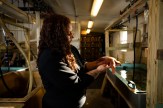A bright future for infectious disease research

Every year, nearly a million people die from one of three infectious diseases that few of us have ever heard of. There are no vaccines for them and only a handful of outdated, inadequate, and often toxic drugs are available for treating them.
Chagas disease, leishmaniasis, and African sleeping sickness are all caused by protozoan parasites called trypanosomes. Malaria, which kills hundreds of thousands of people annually, most under the age of five, is caused by a different protozoan parasite. Other global infectious diseases are caused by viruses, like HIV and dengue fever, or by bacteria, like tuberculosis.
In a special presentation hosted by the Office of the Provost, the College of Science, the College of Engineering, and the Bouvé College of Health Sciences, Seattle Biomedical Research Institute founder and Northeastern alumnus Ken Stuart discussed the institute’s current scientific approach to confronting and learning from these global infectious diseases, which, he said, primarily affect the poor.
In the nearly 40 years since its establishment, the institute has gone from fewer than 20 employees to nearly 400. The nonprofit organization aims to prevent and alleviate global infectious diseases while also advancing biological understanding of the pathogens that cause them. “It’s astounding to me what has been learned about trypanosomes since I started working on them,” said Stuart, who graduated Northeastern in 1963 with a bachelor’s degree in biology.
The trypanosomes and malaria have a few things in common, Stuart explained. They are complex organisms all transmitted by insects, and they’re highly adapted to the host. Seattle BioMed’s goal for the trypanosomes is to develop better drugs. For malaria, the goal is to develop vaccines.
In his talk, Stuart also discussed the process of drug discovery and development, which first requires a solid understanding of how the organisms work. “The inherent beauty of the complexity of these organisms is just astounding,” he said. “As you learn more and more, you find there are many more layers of complexity. And it’s all interesting.”
In conjunction with Northeastern chemistry professor Michael Pollastri, Stuart’s team is working to identify existing drugs that can be repurposed for Chagas disease, leishmaniasis, and African sleeping sickness. The institute has also partnered with Northeastern’s graduate campus in Seattle to leverage the two institutions’ complimentary resources.
Stuart presented some promising results from his team’s research on both malaria and Chagas disease. “Progress is accelerating,” he said. “But there’s a concerted and coordinated effort that’s needed to really bring this to fruition.” Through collaborations like those between Seattle BioMed and Northeastern, the future is bright for global infectious disease research, he said.





